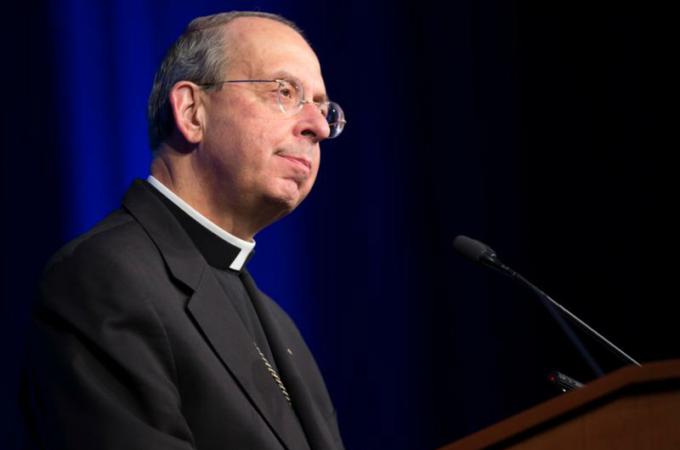Archbishop calls Baltimore police report 'sobering and distressing'
BALTIMORE (CNS) -- The same day a federal Department of Justice report cataloging systemic abuses by Baltimore's police was issued, Archbishop William E. Lori of Baltimore called that report "sobering and distressing."
"The report is an affirmation of those in our community who have long criticized the policing strategies and practices of the (police) department," the archbishop said Aug. 10 in a statement, "and a repudiation of those whose actions have undermined both public trust as well as the inherent dignity of those they have sworn to serve and protect."
In Baltimore, the police's "pattern of making unconstitutional stops, searches and arrests arises from its longstanding reliance on 'zero tolerance' street enforcement, which encourages officers to make large numbers of stops, searches and arrests for minor, highly discretionary offenses," the report said.
"These practices led to repeated violations of the constitutional and statutory rights, further eroding the community's trust in the police," it added.
The Justice Department reviewed five-and-a-half years of police records before making its determinations.
The report also revealed racial bias on the part of Baltimore police.
In a city that is 63 percent black, African-Americans made up 95 percent of those stopped at least 10 times without arrests or citations -- one man in his 50s was stopped 30 times -- and 91 percent of those arrested whose only charge was "failure to obey" or "trespassing."
"I encourage people to read the report, reflect on the findings and consider the role that each of us should play in bringing about much needed change," Archbishop Lori said.
The investigation was prompted by the April 2015 death of Baltimore resident Freddie Gray from spinal injuries he sustained riding in the back of a police van after being arrested for possession of what officers said was an illegal switchblade. They suspected Gray was watching out for a drug transaction.
Although Gray's death was ruled a homicide by the city's medical examiner's office and six Baltimore police were charged in connection with Gray's death, one mistrial and a series of acquittals led prosecutors to forgo the trials of the remaining officers.
Protest marches in Baltimore turned violent before and after Gray's funeral, with dozens of police injured and even more protestors arrested. The city of Baltimore paid $6.4 million to Gray's family to avoid a lawsuit.
Fourteen U.S. cities are currently operating under consent decrees with the Justice Department to reform their police practices. Baltimore has not entered into a consent decree, but is expected to do so, although a few elected officials have wondered how to pay for the reforms.
Baltimore Mayor Stephanie Rawlings-Blake had asked the Justice Department to conduct its investigation after the rioting that followed Gray's death. In response to the report she said the findings "are challenging to hear," but are a crucial step in reforming the department.
Archbishop Lori said, "it is clear from the report that nothing short of a change in the culture within the (police) department will result in the kind of reform that is necessary to ensure the fair and equitable treatment of every citizen of Baltimore."
He added, "While this report rightly warrants a collective call for change, we cannot ignore the good and just service of the vast majority of policemen and women who put their lives on the line every day as they carry out their duties with respect for their office and those they serve."
Archbishop Lori said, "I pray the reaction to this report will not obscure their selfless service and will inspire others to follow them and to join efforts to address this resounding call for urgent change."



















